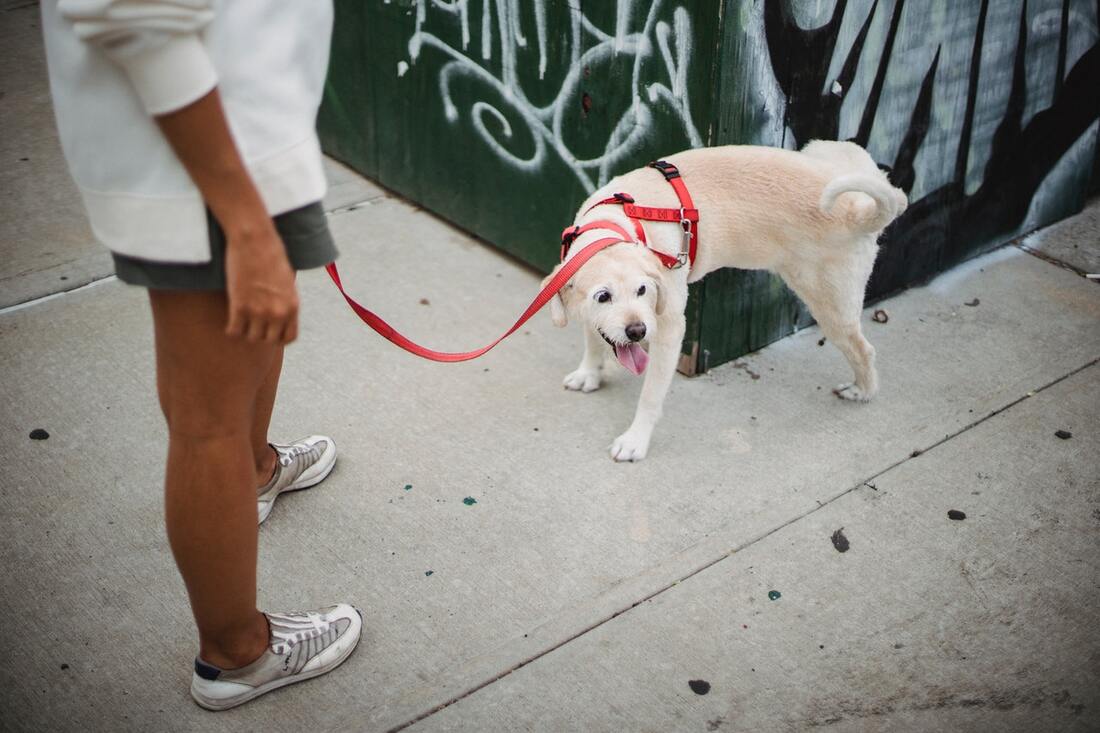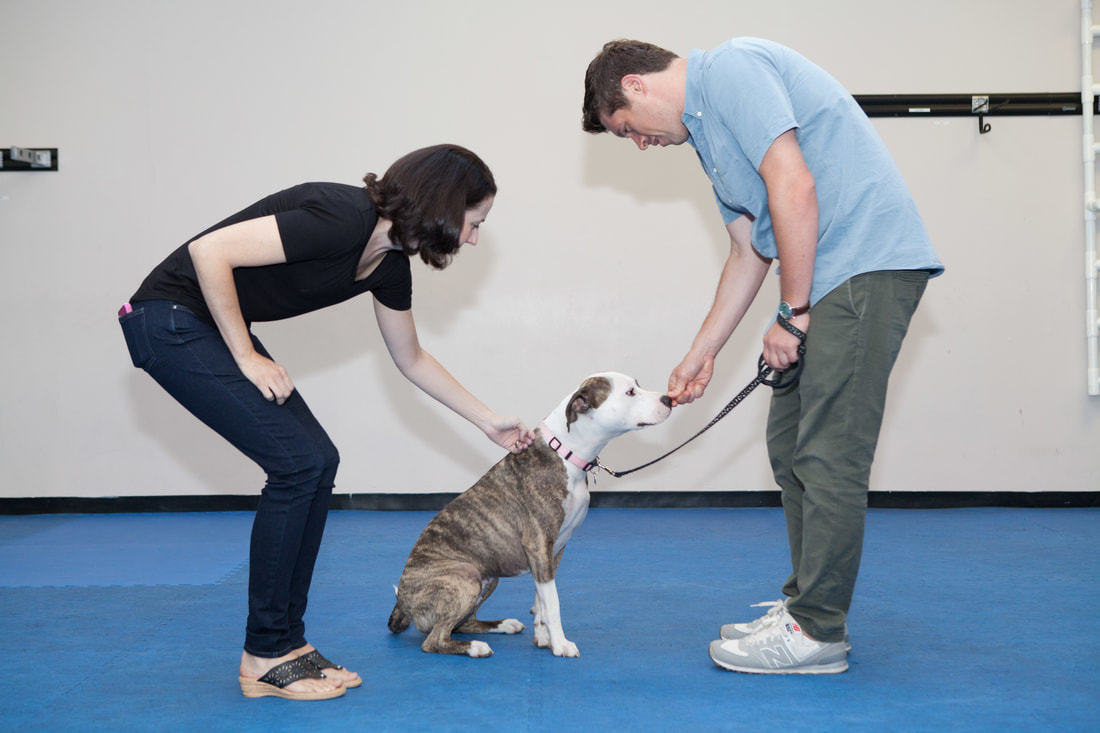|
As a dog trainer working with many apartment-dwelling clients, housetraining is an important, sometimes messy topic. Many people adopt a dog or puppy, or get one from a breeder, with the assurance that the dog is housetrained. But minutes after bringing their bundle of joy home, Rover starts leaving housewarming presents on their handcrafted oriental rug. Click Read More if you don't see the text below.
0 Comments
 To some dogs, everything is a chew toy. If your dog or puppy has an appetite for destruction, it’s important to address it sooner rather than later. While most of us humans see our home decor as something to preserve for many years, our dogs may have a different opinion. To them, nothing is more exhilarating than ripping a pillow apart, and chomping on an antique table leg is a great way to pass an otherwise boring day. Click Read More if you don't see the text below.  Even when it’s too cold to do much outdoors, you can create challenging activities for your dog to do inside your home. You can’t go wrong with scent games, as they are naturally fun for any dog and can even carry behavioral benefits. On bad-weather days, scent games are the perfect way to break up the monotony of being cooped up indoors. If you have an elderly or injured dog who spends most of his time inside, scent games provide a mental and physical challenge, but you don’t need to worry about overexertion. These activities can also help active dogs burn energy in a small space without getting overly amped up. Click Read More if you don't see the text below. When a veterinarian and a dog trainer get together, what do you think they talk about? (Hint, the #1 topic is probably "#1" and "#2.") I had the pleasure of sitting down with friend and veterinarian Kaarin Vekman, DVM, to play a little game we called, "Whom should you call first: your vet or a trainer?" As a trainer, I get a lot of questions about topics that should really be directed to a vet. Likewise, vets are often asked behavior questions that are more in a trainer's territory. Then there are other cases where vets and trainers can work together to tackle a dog's issue from both medical and behavioral angles. And so when your dog is having a problem, it can be difficult to know where to start. Our game covers issues such as house training, separation anxiety, puppy vaccinations, nutrition, aggression, and nail trims. Though we were both involved in creating the questions, we didn't discuss our answers ahead of time. This game was also a good test for Dr. Vekman and me. Prior to playing the game, I was worried we would have widely differing points of view and possibly end our friendship over the contentious "puppy vaccination" topic. And while we do look at the same issue from different angles, it turns out these differences do not lead to confusion or conflict; rather, educating owners from both a medical and behavioral perspective can give them a more well-rounded understanding of their dogs' conditions. You love your dog, that’s a given. But do your neighbors feel the same way? Make sure your dog has neighbor etiquette both indoors and out, so he brings a smile to everyone’s face.
Well-behaved dogs are made, not born. To ensure your dog is a pleasure for everyone in the neighborhood to be around, a little training and management will go a long way to prevent bad habits from forming. Here are some ways to get started. Read the full article here on petguide.com, or click "Read More" if you don't see the text below. (Photo by constantism.com. Check him out!) Your cute new dog or puppy may bring some not-so-cute consequences: house soiling, furniture eating, or lack of doggie manners. Even as a dog trainer, I’ve felt a wave of “buyer’s remorse” after bringing home a new dog. Adding a dog to your family is a major change for both the humans and (especially) the canines, and it naturally comes with stress. But don’t despair! The tips below have helped me get through the awkward transition from having a doggie-roommate to a beloved family member.
Read the full article here at petguide.com, or click "Read More" if you don't see the text below. Does your dog bark when left alone? Eat your furniture to pass the time? Constantly demand your attention? Save your sanity by turning your pup’s mealtime into playtime. All kinds of dogs can benefit from food-dispensing toys, if chosen carefully and used properly. Here are five ways to add these toys to your daily routine to encourage good behavior from your best friend. Click "Read More" if you don't see the text below. Why use a boring old bowl when you can turn mealtime into a game? Mealtime is the perfect time to provide a fun way for your dog to expend his energy, all with no extra work on your part. Read the full article here at petguide.com, or click "Read More" if you don't see the text below. And check out Batman's preferred toy, Kong Genius Mike, in this video.
You adopted a puppy and took a whole week off to make sure he’s settled into his new home. Then, after your first day back to work, you find a note on your apartment door: “Your dog has been barking all day. Please make it stop.”
At this point, you might assume your dog has separation anxiety and your life is about to be turned upside down. True separation anxiety can be a difficult issue to deal with, but the good news is that many people who think their dogs have separation anxiety are mistaken. In this case, it’s good to be wrong! What looks like SA may actually be temporary stress when a dog comes to a new home, a surplus of doggie energy that is not being sufficiently burned, or plain old boredom while home alone. Click "Read More" if you don't see the rest of the text below. |
Welcome!Kate is a certified dog behavior consultant, certified dog trainer, certified Fear Free professional, certified dog parkour instructor, and award-winning author. Categories
All
Archives
January 2024
The views expressed on this website belong to Kate Naito and may not reflect the views of the agencies with which she trains.
|





 RSS Feed
RSS Feed